
Dear World is a musical with music and lyrics by Jerry Herman and book by Jerome Lawrence and Robert E. Lee. With its opening, Herman became the first composer-lyricist in history to have three productions running simultaneously on Broadway. It starred Angela Lansbury, who won the Tony Award for Leading Actress in a Musical in 1969 for her performance as the Countess Aurelia.
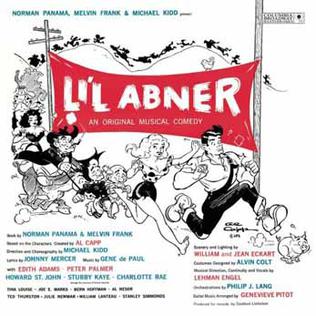
Li'l Abner is a 1956 musical with a book by Norman Panama and Melvin Frank, music by Gene De Paul, and lyrics by Johnny Mercer. Based on the comic strip Li'l Abner by Al Capp, the show is, on the surface, a broad spoof of hillbillies, but it is also a pointed satire on other topics, ranging from American politics and incompetence in the United States federal government to propriety and gender roles.
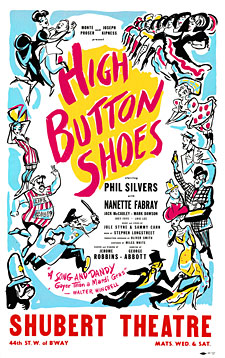
High Button Shoes is a 1947 musical with music by Jule Styne, lyrics by Sammy Cahn and book by George Abbott and Stephen Longstreet. It was based on the semi-autobiographical 1946 novel The Sisters Liked Them Handsome by Stephen Longstreet. The story concerns the comic entanglements of the Longstreet family with two con men in Atlantic City.
Lock Up Your Daughters is a musical based on the 1730 comedy Rape upon Rape, by Henry Fielding, and adapted by Bernard Miles. The lyrics were written by Lionel Bart and the music by Laurie Johnson. It was first produced on the London stage in 1959.
Martin Charnin was an American lyricist, writer, and theatre director. Charnin's best-known work is as conceiver, director, and lyricist of the musical Annie.

All American is a musical with a book by Mel Brooks, lyrics by Lee Adams, and music by Charles Strouse. Based on the Robert Lewis Taylor 1950 novel Professor Fodorski, it is set on the campus of the fictional Southern Baptist Institute of Technology: the worlds of science and sports collide when the principles of engineering are applied to football strategies, and football strategies are used to teach the principles of engineering. The techniques of a Hungarian immigrant, Professor Fodorski, prove to be successful, resulting in a winning team, and he finds himself the target of a Madison Avenue ad man who wants to exploit his new-found fame.

Dames at Sea is a 1966 musical with book and lyrics by George Haimsohn and Robin Miller and music by Jim Wise.

Take Me Along is a 1959 musical based on the 1933 Eugene O'Neill play Ah, Wilderness, with music and lyrics by Bob Merrill and book by Joseph Stein and Robert Russell.

The Goodbye Girl is a musical with a book by Neil Simon, lyrics by David Zippel, and music by Marvin Hamlisch, based on Simon's original screenplay for the 1977 film of the same name.

La Strada is a musical with lyrics and music by Lionel Bart, with additional lyrics by Martin Charnin and additional music by Elliot Lawrence. It is based on the 1954 film of the same name by Federico Fellini. Bart wrote the score in 1967 and made a demonstration recording, although the musical was not produced until 1969, when it was famously cancelled after just one performance. The musical's book was written by Charles K. Peck, Jr., who also produced it on Broadway.
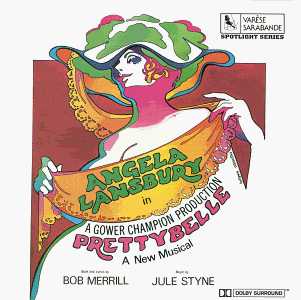
Prettybelle is a musical with a book and lyrics by Bob Merrill and music by Jule Styne. It was adapted from Jean Arnold's darkly comic novel Prettybelle: A Lively Tale of Rape and Resurrection. It starred Angela Lansbury, but never was produced on Broadway and closed in Boston in 1971.
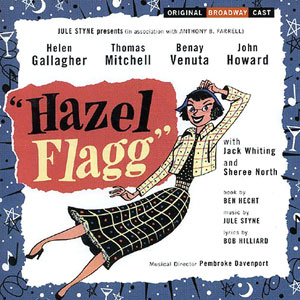
Hazel Flagg is a 1953 musical, book by Ben Hecht, based on a story by James H. Street. The lyrics are by Bob Hilliard, and music by Jule Styne. The musical is based on the 1937 screwball comedy film Nothing Sacred, the primary screenwriter of which was Ben Hecht.
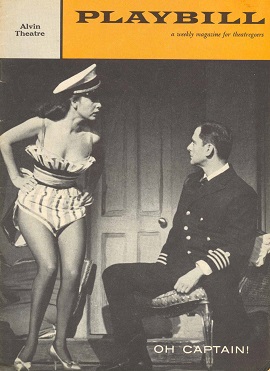
Oh, Captain! is a musical comedy based on the 1953 film The Captain's Paradise with music and lyrics by Jay Livingston and Ray Evans and the book by Al Morgan and José Ferrer. The basis of the musical was the 1953 film The Captain's Paradise, which had been written by Alec Coppel and Nicholas Phipps.
![<i>Dearest Enemy</i> Musical by [[Herbert Fields]], [[Lorenz Hart]] and [[Richard Rodgers]]](https://upload.wikimedia.org/wikipedia/en/b/b4/DearestE.jpg)
Dearest Enemy is a musical with a book by Herbert Fields, lyrics by Lorenz Hart, and music by Richard Rodgers. This was the first of eight book musicals written by the songwriting team of Rodgers and Hart and writer Herbert Fields, and the first of more than two dozen Rodgers and Hart Broadway musicals. The musical takes place in 1776, during the American Revolutionary War, when Mary Lindley Murray detained British troops long enough in Manhattan to give George Washington time to move his vulnerable troops.
Home Sweet Homer is a 1976 musical with a book by Roland Kibbee and Albert Marre, lyrics by Charles Burr and Forman Brown, and music by Mitch Leigh.
Marcy Heisler is a musical theater lyricist and performer. As a performer, she has performed at Carnegie Hall, Birdland, and numerous other venues throughout the United States and Canada. Heisler was nominated for the 2009 Drama Desk Award for Outstanding Lyrics for Dear Edwina.
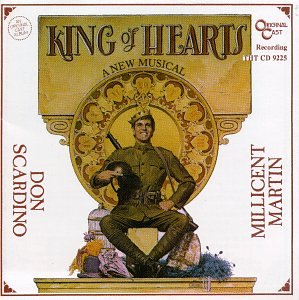
King of Hearts is a 1978 musical with a book by Joseph Stein, lyrics by Jacob Brackman, and music by Peter Link, orchestrated by Bill Brohn. It is based on the 1966 anti-war cult film of the same name.
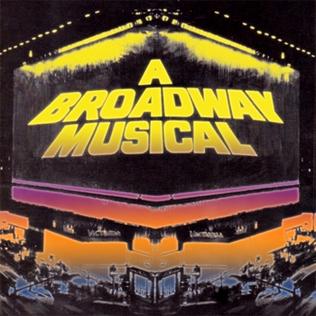
A Broadway Musical is a musical with a book by William F. Brown, lyrics by Lee Adams, and music by Charles Strouse. The Broadway production closed after 14 previews and only one performance on December 21, 1978.

Mary Ellen Dowd was an American stage, musical theatre and film actress, and singer, whose career spanned half a century. Beginning in Shakespeare roles and films in the 1950s, Dowd continued to perform on stage, film and television into the 21st century. A frequent performer on Broadway in the 1960s, Dowd originated the role of Morgan le Fay in the musical Camelot.
Tom Morrow (1928–1994) was an American painter and commercial artist, best known as the designer of numerous iconic advertisements for Broadway plays and musicals from the 1950s to the 1980s. In 1975, Morrow was credited with "having the distinction of creating artwork for more Broadway musicals and plays than any other living artist".












![<i>Dearest Enemy</i> Musical by [[Herbert Fields]], [[Lorenz Hart]] and [[Richard Rodgers]]](https://upload.wikimedia.org/wikipedia/en/b/b4/DearestE.jpg)


